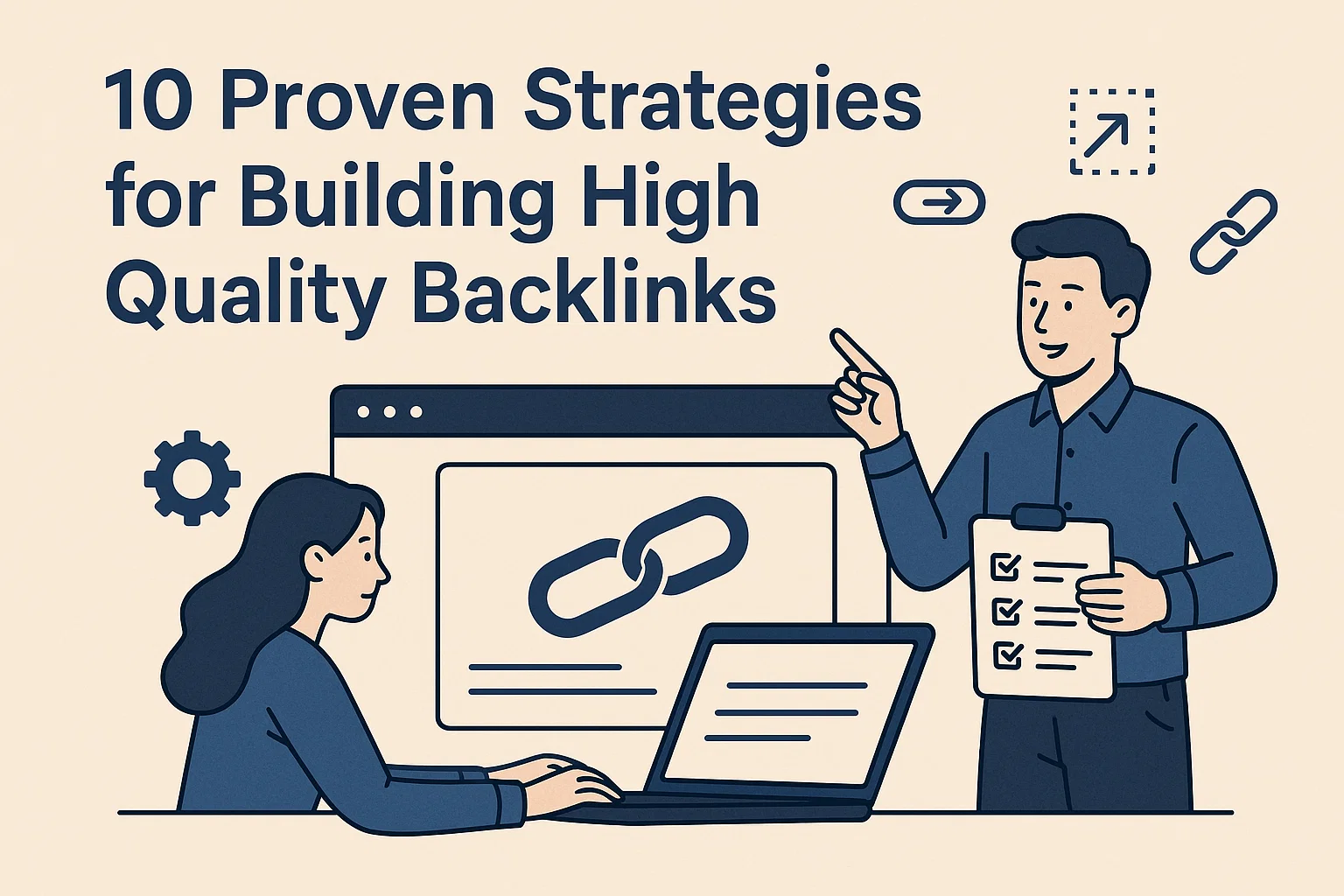Backlinks are one of the most powerful elements of SEO. When search engines like Google see that other reputable websites are linking to your content, they interpret it as a sign of trust and authority. As a result, your website’s ranking on search engine results pages (SERPs) improves. However, not all backlinks are created equal. Quality backlinks from authoritative, relevant sources are far more beneficial than a large quantity of low-quality links.
In this blog, we’ll explore 10 proven strategies for building high-quality backlinks that can significantly enhance your SEO efforts and help you climb the ranks in search engines.
1. Create High-Quality, Shareable Content
Content is at the core of every successful backlink strategy. The more valuable and engaging your content is, the more likely others will want to link to it. Content that provides useful information, solves problems, or answers questions tends to attract backlinks naturally.
- Infographics: People love visuals, and infographics are one of the most shareable forms of content. If you create high-quality, informative infographics, they’re likely to be shared and linked to by other websites.
- Comprehensive Guides: In-depth resources or ultimate guides provide detailed answers to specific questions in your industry. These long-form pieces tend to attract backlinks because they become a go-to resource for others in your niche.
- Case Studies: Publishing original research or case studies is another way to earn valuable backlinks. Businesses and influencers will link to your case study to support their own content.
Tip: The more informative, unique, and well-designed your content is, the more it’s likely to be shared and linked to by others.
2. Guest Posting on Relevant Websites
Guest posting is one of the most effective ways to build backlinks, particularly if you’re looking to gain high-quality, authoritative links. By writing high-quality guest posts for reputable websites in your niche, you can secure backlinks while simultaneously increasing your visibility.
- Target High-Authority Sites: Focus on websites and blogs that have a strong following and domain authority in your niche.
- Provide Value: Write informative, well-researched guest posts that add real value to the host site’s audience. In return, they’ll likely include a backlink to your site in the article.
Tip: Always ensure that the guest post aligns with your brand’s values and target audience. This makes the backlink more relevant and valuable.
3. Broken Link Building
Broken link building is a strategy where you find broken links (404 errors) on other websites and suggest your content as a replacement. This helps webmasters fix their broken links while providing you with an opportunity to secure a high-quality backlink.
- How to Find Broken Links: Use tools like Ahrefs, Screaming Frog, or Broken Link Checker to identify broken links on authoritative websites within your niche.
- Reach Out: Once you’ve found broken links, reach out to the site owner and suggest your content as a relevant replacement.
Tip: Make sure the content you’re suggesting as a replacement is high-quality and relevant to the page. A well-crafted, thoughtful email to the website owner can increase your chances of earning the link.
4. Leverage Influencer Outreach
Influencer marketing isn’t just for product promotions—it can also be an excellent tool for building backlinks. By connecting with influencers and industry leaders in your niche, you can encourage them to mention or link to your content in their blogs, articles, or social media posts.
- Find Influencers: Look for influencers who have a strong online presence in your industry, and ensure they align with your brand’s values.
- Build Relationships: Start by engaging with them on social media or commenting on their content. Once a relationship is established, you can pitch relevant content that would benefit their audience.
Tip: Approach influencers with personalized and thoughtful outreach. Offer them something of value in return, like sharing their content or collaborating on a project.
5. Resource Page Link Building
Many websites feature resource pages that link to valuable tools, content, or industry-specific resources. By identifying these resource pages and getting your content listed, you can earn valuable backlinks from trusted websites.
- Identify Resource Pages: Use search queries like “intitle:resources” or “best [your niche] tools” to find relevant resource pages within your industry.
- Reach Out: Once you find resource pages, reach out to the website owners and suggest your content as a valuable addition to their list.
Tip: Ensure your content is truly valuable and unique before reaching out to resource pages. If it’s not helpful to the page’s audience, your request may be denied.
6. Build Relationships with Other Bloggers
Building relationships within your industry can lead to mutual backlinking opportunities. Engaging with other bloggers and content creators in your field can result in them linking to your content, either through collaborations or casual mentions.
- Comment on Blogs: Leave thoughtful, relevant comments on blogs within your niche. Over time, this can lead to relationship-building and potential backlinking opportunities.
- Collaborate: Reach out to other bloggers for collaboration opportunities, such as joint blog posts, webinars, or interviews. These collaborations often include backlinks to each other’s websites.
Tip: Relationships take time to build, so focus on offering value to others in your industry before asking for backlinks.
7. Submit Your Website to Online Directories
Submitting your website to reputable, niche-specific online directories can help improve your backlink profile and drive targeted traffic to your website. However, it’s important to focus on high-quality, trustworthy directories, as low-quality directories can harm your SEO.
- Focus on Niche-Specific Directories: Submit your website to directories that are relevant to your industry and have a strong domain authority.
- Avoid Spammy Directories: Steer clear of directories that look like link farms or contain irrelevant listings, as these could negatively impact your SEO.
Tip: Include complete and accurate business information in your directory submission, and ensure it aligns with your overall SEO strategy.
8. Participate in Industry Forums and Communities
Participating in industry-specific forums, online communities, and Q&A platforms like Quora can help you build backlinks and establish yourself as an authority in your niche. When you share insights, answer questions, and contribute to discussions, you can include backlinks to your site.
- Be Helpful: Focus on offering genuine advice, valuable resources, or helpful insights rather than just dropping links.
- Build Authority: Establish yourself as a credible source by providing well-thought-out answers and contributing meaningful content.
Tip: Don’t overdo the self-promotion—focus on building credibility and providing value, and the backlinks will come naturally.
9. Conduct Expert Roundups
Expert roundups are blog posts that feature insights from multiple experts in a particular industry. These roundups are often highly shareable and attract backlinks from the experts featured in the post.
- Reach Out to Experts: Create a blog post that asks industry leaders for their opinions on a particular topic and include their insights in your post.
- Promote the Roundup: After publishing the roundup, share it with the experts you featured and encourage them to share it with their audience. This will often lead to backlinks.
Tip: Make sure to reach out to industry leaders who have an engaged following and a strong online presence. Their backlink will carry more weight.
10. Use Social Media for Link Building
While social media backlinks are typically no-follow (they don’t directly impact SEO), they can still generate referral traffic, increase brand visibility, and lead to earned backlinks from authoritative sources.
- Share Your Content: Post your content on social media platforms, including links to your blog posts, product pages, and other important content.
- Engage with Influencers: By interacting with influencers and thought leaders on social media, you increase the chances of your content being shared and linked to by others.
Tip: Make your content shareable by adding social sharing buttons and promoting it across multiple platforms to increase its reach and backlink potential.
Conclusion
Building high-quality backlinks is one of the most effective SEO strategies for improving your website’s authority and search engine rankings. While it requires time and effort, implementing these 10 proven link building strategies can help you create a solid backlink profile that boosts your visibility, drives organic traffic, and establishes your website as a credible authority in your niche.
At Speed Dot 360, we specialize in professional link building services that help businesses earn high-quality backlinks from authoritative sources. If you’re ready to enhance your SEO and dominate your industry, get in touch with us today to learn more about our proven strategies.
Frequently Asked Questions
Q1: How long does it take to see results from link building?
Link building efforts can take several weeks to a few months to show measurable results, depending on the quality of the backlinks and the competition in your industry.
Q2: What is the difference between a do-follow and a no-follow backlink?
A do-follow backlink passes on SEO value (link juice) to the linked page, improving its search engine rankings, while a no-follow backlink does not pass on link equity but can still drive traffic and help with brand visibility.
Q3: Can I build backlinks myself, or should I hire a professional?
While you can build backlinks on your own, working with a professional link building service can help you acquire high-quality backlinks more efficiently and avoid penalties from search engines.
Q4: How many backlinks should I aim for?
The number of back links you need depends on your industry, competition, and SEO goals. Focus on acquiring a few high-quality backlinks rather than a large number of low-quality links.
Q5: Can backlinks harm my website’s SEO?
Yes, if you engage in unethical link building practices, such as buying backlinks or participating in link farms, it can lead to penalties from search engines. Always focus on natural, high-quality links from reputable sites.





